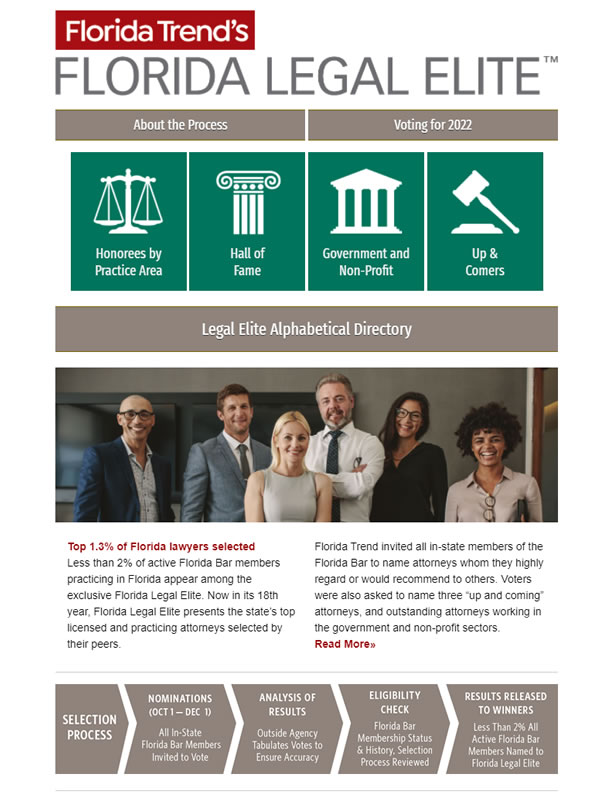SHARE:

Mark R. Howard
Editor's Page
Just Say No: A disgraceful assault against Floridians
The 2017-18 Florida Constitution Revision Commission, which wrapped up its work in May, has 37 members and convenes every 20 years. Based on this commission’s most recent work, it might be a good idea to reverse those numbers.
Florida is the only state with a commission that meets to suggest state constitution changes — the document that picks up where the U.S. Constitution leaves off in defining the relationship between Floridians and our state government. The commission is meant to function both as a group of wise, informed leaders who originate ideas themselves, as well as a forum where commission members hear ideas from citizens. The commission sets its own rules and procedures and then votes on which proposed changes to put before voters on the ballot.
The commission’s members are chosen by the governor, the chief justice of the Florida Supreme Court, the president of the Senate and the Speaker of the House.
Given the appointers, those appointments are necessarily political, as are the issues that they consider. Well and good. The late Dexter Douglass, who chaired the commission when it met 20 years ago, was hardly a disinterested party — he was the late Gov. Lawton Chiles’ friend, confidant and general counsel. Florida Trend interviewed Douglass right after the 1997-98 commission finished its work, and he was quite open about the political calculations that went into the commission’s deliberations.
For a full list of the 13 proposed amendments. see:
» Florida's constitutional amendments are a mixed bag (includes explanations, pros and cons, political context)
Douglass, a conservative, said he had steered the 1997-98 commission away from trying to make any big changes in the state’s taxing structure, for example, in order to give other measures a chance to not be swept away in an anti-tax tide. Douglass’ group developed a proposal for restructuring the state Cabinet but bowed to pressure from agricultural interests and dropped the idea of eliminating the ag commissioner’s job as part of the proposal.
Voters approved the Cabinet restructuring, along with 11 other amendments from the commission. Some were feel-good, some more substantive. They included establishing the Fish and Wildlife Conservation Commission; establishing education as a “paramount duty of the state;” allowing local governments to increase the homestead exemption for elderly residents; and allowing local governments to require their own criminal background checks and waiting periods for firearms sales. (Voters approved that measure 72% to 28%, by the way.)
The 2017-18 commission likewise had plenty of politics and personal agendas in the stew. Most notably, House Speaker Richard Corcoran and Gov. Rick Scott appear to have stagemanaged the evolution of many of the measures the commission decided to put on the ballot. Scott got a feel-good victims rights measure, along with another that restricts universities’ ability to impose or raise student fees. Corcoran wanted a measure to prohibit certain officials, including state lawmakers and local elected officials, from getting paid to lobby their former colleagues. And another allowing some charter schools to operate under state supervision rather than by local school boards.
Well and good. Whether feel-good or more substantial, those ideas all might have been worthy of discussion and consideration by voters.
The difference between the 1997-98 commission and the 2017 -18 commission isn’t the level of political calculation in the mix. It’s the level of sheer gutlessness and cynicism on the part of the current commission and its string-pullers.
However calculating Douglass was, the proposals that his commission delivered to voters were single-topic. One proposal per amendment, clear and well-defined.
The current commission, by contrast, took a collection of individual proposals and turned them into steaming piles of confusion, lumping multiple measures willy-nilly into single amendments. They clearly didn’t trust the voters to evaluate each idea on its own merits, hoping we’d be willing to swallow controversial proposals if they’re sugar-coated in feel-good provisions. And so we get to vote on a proposed amendment that incongruously couples three issues: A guarantee of benefits for the families of first responders killed on duty, along with a measure restricting universities’ ability to levy fees — and a third that restricts the activities of state colleges. Another proposal also squeezes three ideas into one amendment: A measure that does away with an outdated law barring some immigrants from owning property; a housekeeping measure involving criminal laws; and another removing the language related to high-speed rail — which voters have already repealed — from the constitution.
Worst is the proposal that couples a ban on offshore oil and gas drilling in Florida’s territorial waters with a prohibition on vaping in indoor workplaces. The thematic connection between those two issues is non-existent.
Coating meaty, controversial measures with feel-good may be standard practice in the Legislature, but the constitution — and voters — deserve more respect. Voters probably should throw up their hands and just vote no on the whole batch. That will be unfortunate because that means nixing five other proposed amendments on the ballot. Those five — created by either private initiatives or the Legislature — are all single-topic, intelligible and worthy of real consideration.
Injecting cynical, short-term legislative politics into a process that’s supposed to be more thoughtful and take a longer view is disgraceful. It’s worth noting that Douglass, 20 years ago, said the amendments his commission put on the ballot were conservative, and calculated, at one level, “to improve the relationship between the citizens and the government, which we learned in our public hearings is in very bad shape. Citizens are very dissatisfied with the Legislature … and we think some of these proposals will help.”
As for having the commission shrink to 20 members who meet once every 37 years, that, of course, would take a constitutional amendment.
See other stories from Florida Trend's July issue.
Get Florida Trend's July magazine – print or digital. Select from these options:
* offer valid for new subscribers only























